After refurbishing his hen housing last month, Alan Holtham switches his expert, practical attention to his chicken runs, and what’s needed to bring those back up to scratch.

Sadly, this winter has been a little different from the past few, given the Defra-imposed restrictions we’re all having to live with for the time being. Confining the birds inside has undoubtedly put extra pressure on housing, but it’s also highlighted the benefits of having a covered run, however makeshift it may be.
Having experienced the advantages of cover first hand, as a result of recent events, I’ve heard from a lot of keepers who are now thinking about making their temporary covered structures more permanent – when time and finances allow – particularly if AI scares are going to become a regular issue.
Covered advantage
I have a mixture of both covered and open runs and, before the lockdown came into force, the open ones had already started to degenerate into the usual sea of mud that’s so unhealthy for both the birds and their keeper. Squelching through it on dark, winter’s night is no joke.
However, one positive of having the birds shut away – if there can be one – is that it gives you the chance to really get to grips with sorting the outside runs, while they’re empty. So let’s stay positive and get cracking on these open runs, in the hope that they’ll be usable again soon. Ideally, open runs should be movable, so you can rest the ground within them to avoid worm build-up, and allow the grass to re-grow.
It’s amazing what powers of recovery grass has. My empty field run has started to green-over in just a few weeks, despite the fact that winter’s still with us. Resting the ground is a basic husbandry technique recommended in all my old poultry books, even those dating back to the 1800s.
Bu hikaye Practical Poultry dergisinin Spring 2017 sayısından alınmıştır.
Start your 7-day Magzter GOLD free trial to access thousands of curated premium stories, and 9,000+ magazines and newspapers.
Already a subscriber ? Giriş Yap
Bu hikaye Practical Poultry dergisinin Spring 2017 sayısından alınmıştır.
Start your 7-day Magzter GOLD free trial to access thousands of curated premium stories, and 9,000+ magazines and newspapers.
Already a subscriber? Giriş Yap
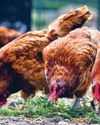
Growing food for Chickens
Mary Larham explores some crops to grow on your holding…
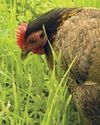
Poultry in the garden – the truth!
Jo-Jane Buxton shares her experiences

The British Waterfowl Association
Which came first, the goose or the egg?

WHY FIT A FAN IN AN INCUBATOR?
Brinsea Products, the Incubation Specialists explain the difference between still air and forced draught
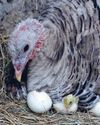
Incubating turkey eggs
Janice Houghton-Wallace looks at broody turkeys and artificial incubation

Chicken nesting box herbs
Diana Clauss owns The Blue Feather Farm, in St Cloud, Florida, home to chickens, ducks, goats, and Anatolian Shepherd dogs.
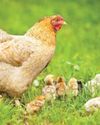
Incubate in January?
Jessica Wombwell says plan the breeding
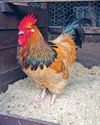
Andy's DIARY
Andy emphases the importance of keeping out damp and wet but allowing ventilation even in cold weather
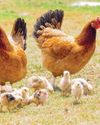
Feeding for Breeding
It may be winter, but as Joanna Palmer, nutritionist for Smallholder Range explains, now’s the time to get your flock in tiptop shape and plan ahead for a successful breeding season next spring.

A chick named Cuckoo raised by a duck!
Chris Hammacott and her husband live on a small croft in the Outer Hebrides, they keep a ‘no kill’ flock or rare and rescue sheep which they use to spin and weave rugs. They also share the 8 acres with hens, ducks, cats and 9 rescue pugs.